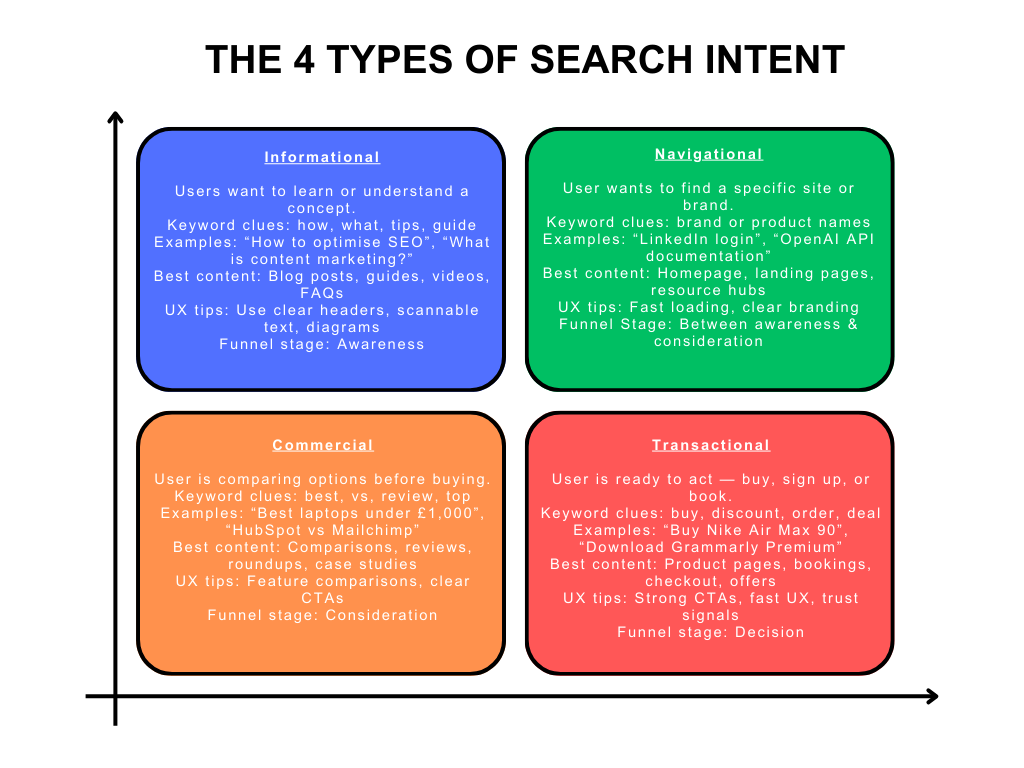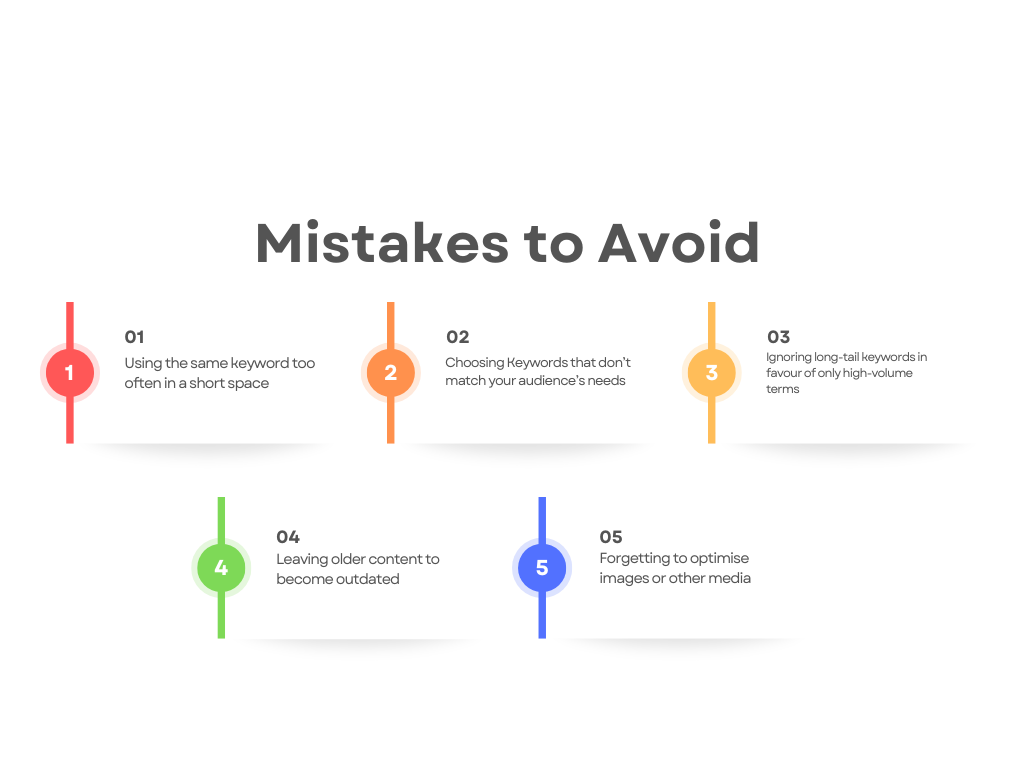How to Successfully Include SEO Content Keywords in Your Writing
Why Keywords Still Matter in SEO
Keywords link what someone types into a search bar with the content they find. They help search engines understand your page and guide people to the right place. If you want your website to be seen in the search engine results pages (SERPs), knowing how to choose and use keywords is essential.
Today, it’s no longer about repeating a keyword as many times as possible. Search engines now (and have for some time) look for quality content that meets the needs of the reader. Keywords need to be added in a way that feels natural, makes sense, and shows your page is relevant. Search engines are also smarter, looking for semantically relevant alternatives of a word rather than exact matches. By understanding how to select the right terms, place them effectively and keep them relevant over time, you can attract the right visitors and keep them engaged.
Understanding Keyword Research and Search Intent
The first step to using keywords well is research. You need to know what people are searching for and why they are searching for it. We have already written a detailed blog on search intent, and you can check it out here for more insights into the topic. Here are the four pillars of search intent:
4 Types of Search Intent
You can use a free keyword research tool, such as Google Keyword Planner or Ubersuggest, to find potential target keywords. These tools show you the monthly search volume for each term, how competitive it is, and suggest related search terms you might not have thought of.
Google Trends can also be helpful. It shows how interest in a keyword changes over time. You might find a search term that is becoming more popular, which could give you better results in the long term.
Building and Refining Your Keyword List
Once you’ve researched possible keywords, create a keyword list. This is more than just a collection of words. It should be organised so you know which terms will go where and how they fit into your plan.
Keyword List
For example, if your focus keyword is “SEO content keywords”, your supporting keywords might be “keyword placement for SEO” or “optimising page titles”. A long-tail keyword could be “how to integrate SEO keywords into blog posts naturally”.
Organising your keywords stops different pages from competing for the same term. It also makes sure each page has a clear role in your site.
Matching Keywords to the Right Content
Not all keywords belong in blog posts. Some work best on product pages, while others are better suited to guides or landing pages. The type of content should match the search intent.
Informational keywords are ideal for blog posts or tutorials. Commercial keywords work for comparison articles, case studies, or service pages. Transactional keywords are best for product pages or sales-focused landing pages.
If the keyword matches the content type, the page will feel more useful to visitors. When people find what they expect, they are more likely to stay and take action.
Placing Keywords for Maximum Impact
It’s not just which keywords you choose, but where you place them that matters. Well-placed keywords help search engines understand your page and improve your chances of ranking in the results page.
Page titles should include your focus keyword early on. A clear, relevant title also helps encourage clicks.
Headings and subheadings can use variations of your target keyword. This makes your content easier to read and supports your main term.
The opening paragraph is another key area. Using your focus keyword here tells both the reader and search engines what the page is about.
In the body of your content, add keywords where they fit naturally. If you force them in, the writing will sound unnatural and could harm rankings.
Meta descriptions are important for click-through rates. They should be short, include your focus keyword, and make the page sound worth visiting.
URLs work best when short and descriptive. Including the main keyword can make them clearer to users and search engines.
The image alt text should describe the image and, if possible, use a relevant keyword. This helps with accessibility and SEO.
Focus on Quality Content First
Search engines prioritise high-quality content that genuinely helps the reader. Keywords should support the writing, not lead it.
Good content is clear, accurate, and organised. It gives useful answers or information that matches the search intent. It should also be kept up to date so it stays relevant.
A good method is to write your first draft without worrying too much about keywords. Once you’ve covered the topic fully, you can go back and add your target keyword and related terms where they fit naturally. This prevents overuse and keeps the writing engaging.
Adding Context with Related Terms
Search engines now look beyond exact keyword matches. They also check related terms and topics to understand a page's full meaning. This is where supporting keywords come in.
For example, if your focus keyword is “organic search”, you might also include terms like “search engine optimisation” or “unpaid search results”. These show you are covering the topic in depth.
Internal linking can also help. Linking one blog post to another relevant page on your site, using descriptive anchor text, shows search engines how your content connects. It also helps visitors find more useful information without leaving your site.
Using Tools to Track and Improve Keyword Performance
Keyword integration is not a one-off job. You need to check how well your keywords are performing and make changes where needed.
Google Search Console is one of the best tools for this. It shows which search terms are bringing people to your site and how many times your pages appear in the results page. You can see which terms are performing well and which ones need more attention.
Google Trends is also worth checking regularly. If you see a topic starting to rise in popularity, you can create content around it before your competitors do.
Keep the User Experience in Mind
Even if your keywords are in all the right places, poor user experience will hold you back. People will leave quickly if your site is hard to read or navigate.
Break up large chunks of text into smaller sections. Use clear headings so people can scan the page. Make sure links and calls to action are easy to find.
Trust also matters. Include accurate sources, author details, or case studies to back up your points. This can increase credibility and keep visitors on your site longer.
Mistakes to Avoid
There are common keyword mistakes that can harm your results:
Mistakes to Avoid
Avoiding these problems will give your content a stronger chance of performing well in organic search.
Thinking Long Term with Keyword Use
The best results come from building your keyword strategy over time. Review your keyword list regularly and adjust it to match new trends or business goals. Update older content to keep it relevant. Track performance with tools like Google Search Console, and expand into new keywords as your site grows.
You can also use social media to promote your content and reach a wider audience. This can bring in visitors who might later find you again through organic search.
Conclusion: Turn Keywords into Real Results
Using keywords well is about more than adding them to a page. It starts with research, understanding search intent, and building a clear keyword list. From there, it’s about placing them in the right places, creating content that meets the reader’s needs, and keeping your strategy up to date.
Done properly, this approach improves your position in the search engine results pages (SERPs) and brings in visitors who are more likely to take action. If you want to make sure your SEO content keywords are bringing measurable results, we can help. Our team can create strategies that match precise keyword targeting with engaging, conversion-focused content. Contact us today to find out how we can help you turn search visibility into long-term growth.


